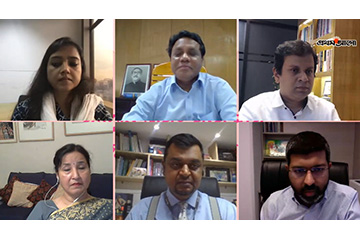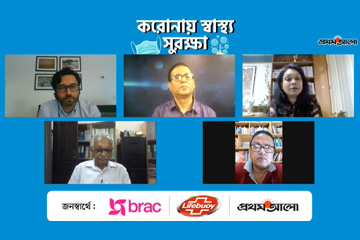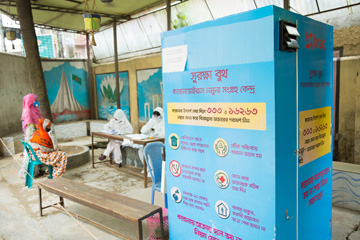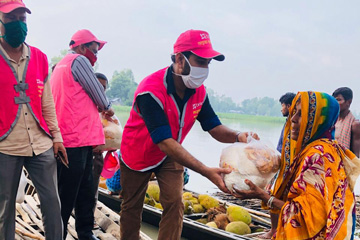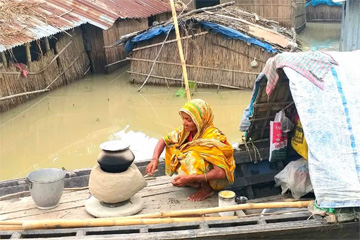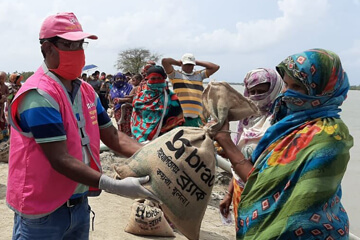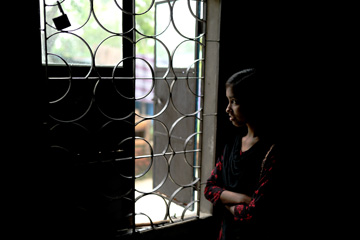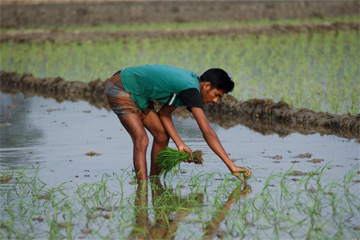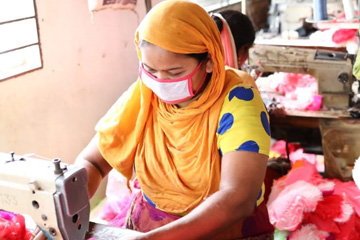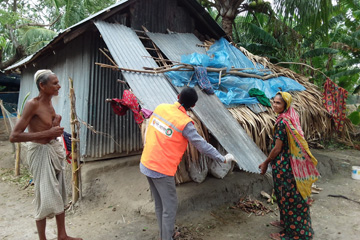
News (828)
Impact of COVID-19 on women entrepreneurs and informal sector workers
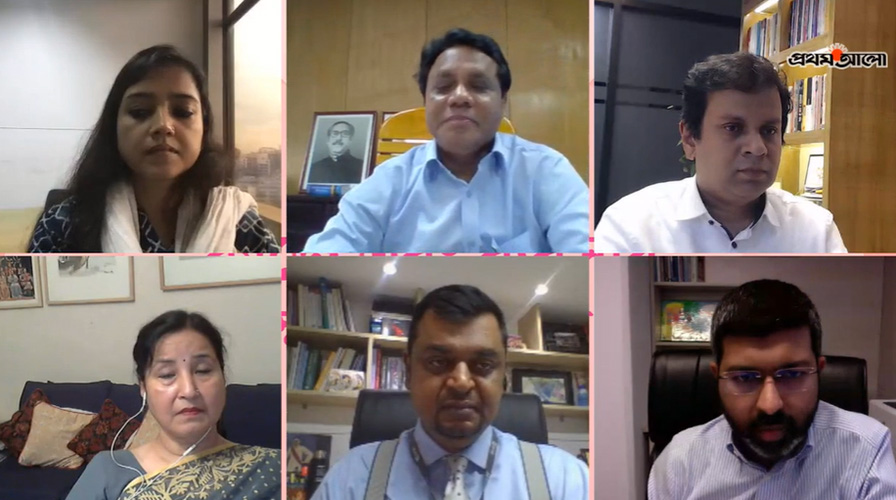
COVID-19 has forced a large number of women entrepreneurs and women working in the informal sectors to lose their income. As a result, women entrepreneurs and informal sector workers respectively faced social, economic and mental challenges, including domestic violence, lowered buying capacity and stress during the pandemic. However, these women showed resilience to fight back and recuperate from the losses they suffered.
The findings along with a number of recommendations of a study titled "Situation of women. CMSME entrepreneurs and informal sector workers: A rapid assessment and quest for recovery from losses induced by COVID-19 pandemic" were revealed at a digitally organised discussion titled “Women Affected in Workplaces and Businesses” today, on Thursday (17 September 2020).
BRAC Gender Justice and Diversity (GJ&D) Programme, with support from Advocacy for Social Change (ASC) conducted the study to look into the situation of women entrepreneurs in the cottage, micro, small and medium-sized enterprises sector and the workers who are employed in the most vulnerable informal sectors.
BRAC director Nobonita Chowdhury moderated the event joined by KM Abdus Salam, secretary to the Ministry of Labour and Employment, as chief guest. Perveen Mahmud, chairperson of UCEP Bangladesh, Ferdous Ara Begum, chief executive officer (CEO) of Business Initiative Leading Development, Rokeya Rafiq, executive director (ED) of Kormojibi Nari, Economist Nazneen Ahmed, Kohinoor Yeasmin, CEO of Tarango, BRAC ED Asif Saleh, BRAC senior directors Shameran Abed and KAM Morshed joined the discussion as panelist. KAM Morshed revealed the key findings of the survey at the beginning of the discussion.
The BRAC study found 65% women entrepreneurs had no income, while 58% women working in the informal sectors had no jobs between February and June during the government imposed holidays to tackle the onslaught of COVID-19 pandemic. As a result, women entrepreneurs and informal sector workers respectively suffered 67% and 66% decline in their personal income. Subsequently, these women (90% entrepreneurs and 84% informal sector workers) faced social, economic and mental challenges, including domestic violence, lowered buying capacity and stress during the pandemic.
A total of 1,589 respondents (589 entrepreneurs and 1,000 workers) in 174 upazilas of 28 districts covering all the administrative divisions joined the survey conducted from 8 to 24 July 2020. Of them, 32% are from rural and 68% from urban areas.
The study found one-third (33%) of the entrepreneurs had to shut their businesses and 41% had to lay off their workers during the pandemic. While 86% entrepreneurs mentioned that they could not take any measures for coping with their business-related challenges, 39% informal sector workers mentioned that they had to borrow money from friends and relatives to survive. During this period, 46% of entrepreneurs and 72% workers reported problems in their households and majority of them said they suffered acute mental stress.
It was also found the entrepreneurs each had an income loss of Tk 2,89,605 in their businesses on an average.
The stimulus package announced for enterprises by the government found to have failed for the entrepreneurs as only 29% of them had knowledge about it. Lack of proper knowledge was to be blamed for this and the majority of the entrepreneurs preferred NGOs for credit support to help their businesses.
The social safety net coverage for the informal sector workers (having zero income between February and June) also found to be inadequate as 72% workers in rural and 49% in urban areas reported that they received no assistance either from government, NGOs or private donors.
The silver lining of the survey, however, was that women entrepreneurs and informal sector workers revealed resilience and only 1% of them said they were planning to leave their previous work or businesses.
Majority (83%) of informal sector workers now expects cash support, while 79% entrepreneurs want credit at easier terms and lower rates of interest to fight back. They also recommended dedicated stimulus packages for women and suggested declaring gender-related services as essentials. Most of the respondents also stressed the need for skills development training both for entrepreneurs and workers.
What the panelists say:
Addressing the discussion, chief guest KM Abdus Salam said the government is bringing about strategic changes in forming different policies.
“Agriculture, industries and other sectors are receiving massive stimulus packages. Karmasangsthan Bank and some other banks are now disbursing loans. We expect the real picture of poverty will be changed by December and we will be able to fight back again,” Secretary Salam added.
Economist Nazneen Ahmed highly appreciated the fact that the survey prioritised cottage, micro and small enterprises and workers involved in these sectors.
“Specific household surveys on entrepreneurs and workers will obviously bring out the actual scenario. If needed, NGOs can be brought in to distribute the stimulus package among those who actually need assistance to tackle the crisis,” she said.
BRAC ED Asif Saleh said, “If we are determined to overcome the crises we have been facing in the past four to five months, the country will definitely move ahead from its present state. We need to ensure issues such as reaching timely assistance to places where those are needed, stopping violence against women and preventing school dropouts.”
Our government, social organisations and NGOs need to work together to ensure that marginalised groups like women do not get rather more marginalised in this crisis, Saleh added.
BRAC senior director Shameran Abed said, “Women entrepreneurs of small and medium enterprises don’t usually get loans from banking institutions. Those from micro enterprises don't even get the chance to knock banks for loans. NGOs need to work in these aspects, but they too have their limitations. That is why we need to find solutions to these problems through a joint effort between public and private sectors.”
Perveen Mahmud, chairperson of UCEP Bangladesh, said, “We need to arrange skills and capacity building training for women so that they can bring changes to their business management to survive the New Normal.”
Business Initiative Leading Development CEO Ferdous Ara Begum said, “I do not think there has been any specific survey involving such a large number of specific sectors, especially cottage and micro-industrial entrepreneurs, during the pandemic. There are various hurdles, but as we have scopes to discuss with 13 secretaries during inter-ministerial consultation meetings at the Prime Minister's Office, we will talk to them especially on the suggestion of providing loan facilities without any collateral for cottage and micro and small entrepreneurs.”
“Our organisation thinks that the rules for lending also need to change for cottage, micro and small entrepreneurs. Bangladesh Bank has also taken some initiatives in this regard recently as these are the sectors that employ about one and a half crore people,” Ferdous Ara Begum added.
Rokeya Rafiq, executive director (ED) of Kormojibi Nari, said, “Although there is no major public-private partnership to help informal sector workers, it is seen that they themselves are trying to survive on their own initiative. They are surviving by changing their professions, working for lowered wages, having only basic diets, giving up on nutritious foods, and saving on the cost of educating their children. We need to help them get back to their previous lifestyle.”
Tarango CEO Kohinoor Yeasmin said, “Many export-oriented businesses have started to turn around again. For example, producers of jute products were the worst affected, but now there is a lot of demand from abroad for jute products as those are considered environment friendly. However, most of the Bangladeshi producers do not export their products. We need to make arrangements for them through public-private initiatives to be connected to the foreign market instead of being dependent only on the local market.”
Lifebuoy-powered BRAC-Prothom Alo 'Eid Health Survey'
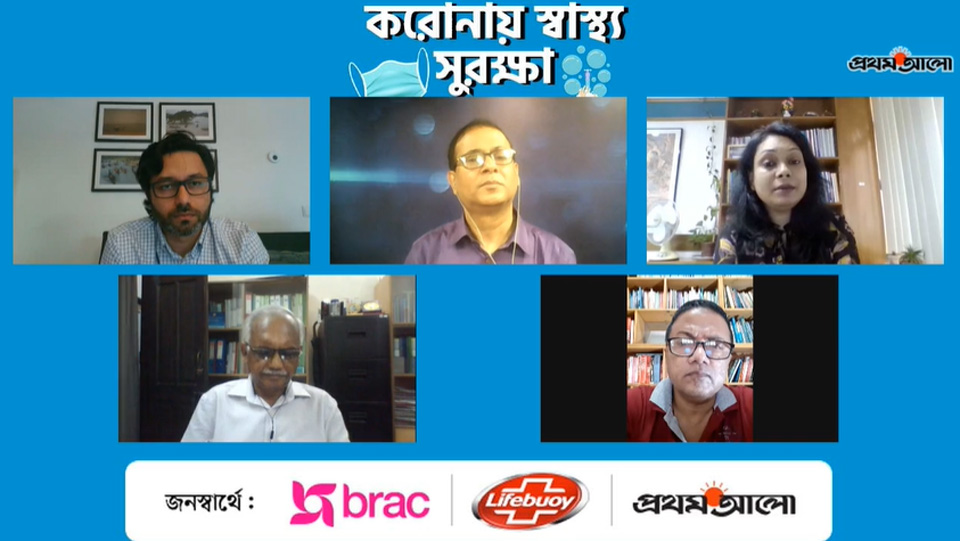
Maintaining physical distance difficult in public places
Mask causes discomfort, stuffiness
The majority of responses, 61.10 per cent, received in a recent online opinion poll viewed that many people cannot maintain safe physical distance in public spaces during COVID-19 pandemic even if they want to as others around them do not follow the rule. According to 67.40 per cent responses, wearing masks causes discomfort and heat stress, while 20.90 per cent mentioned stuffiness and difficult breathing. While 72.60 per cent viewed regular hand washing as beneficial, 6.10 percent said they simply can't remember to wash hands.
The findings of the online opinion survey, jointly conducted by BRAC and the daily Prothom Alo in association with Lifebuoy, were revealed in a digitally organised media briefing today, on Thursday (June 27, 2020). Unilever Bangladesh marketing director Afzal Hasan Khan, BRAC associate director Dr Morseda Chowdhury, and Prothom Alo special correspondent Shishir Moral joined the event moderated by Prothom Alo special news editor Shawkat Hossain.
A total of 320 thousand and 71 responses were received in the survey conducted from 31 July to 18 August (2020). The survey comprised 10 questions, five of which were on wearing masks, four on hand-washing and one on social distancing practices.
Mushtaq Hossain, former chief scientific officer, Institute of Epidemiology, Disease Control and Research (IEDCR), said, “Novel Coronavirus was first detected in our country in March and now it’s August when it is not possible for us to sit at home anymore. We have to run our daily life while maintaining reasonable behaviour and taking effective measures. The public awareness campaign with messages about health safety need to continue. Hand washing stands with soap and water should be placed where necessary, while adequate diagnosis and quarantine facilities have to be ensured. We also need sufficient numbers of volunteers in every neighbourhood to ward off the social stigma around COVID-19 infection. Such opinion polls will help us have a better picture of what’s going on in the field.”
Unilever Bangladesh marketing director Afzal Hasan Khan said, “As a brand Lifebuoy has a mission to save lives. For years and years we have been working to prevent the spread of contagious diseases by helping people maintain their hygiene. From that obligation we have joined BRAC and Prothom Alo in this initiative.”
BRAC associate director Dr Morseda Chowdhury said, “BRAC has stood by the people of Bangladesh with its army of staff since pandemic broke out. We have been working across the country with holistic measures comprising a mass campaign of personal health safety measures to raise public awareness, food and cash assistance for poor and unemployed households and other activities. We have directly provided services to 79 million people since the pandemic had begun. Such surveys are helpful in preventing COVID-19.”
Prothom Alo special correspondent Shishir Moral described at the event his field observations about the country’s corona situation and remarked, “The general public are not taking this danger quite seriously, but lack of rigorous surveillance of the situation may bring much more suffering than we have experienced till now.”
In responses to a question on how masks can reduce the risk of contracting COVID-19, 85.20 per cent viewed that wearing masks properly helps prevent respiratory droplets of sneeze and cough carrying the virus from travelling into the air, while 8.70 per cent maintained masks prevent contaminated air from entering lungs. But, 5.40 per cent responses did not simply believe that masks can reduce the risk of COVID-19.
Many responses (35.50 per cent) showed respondents washed their hands for 3-5 times the day before they participated in the survey. While 25.60 per cent respondents washed their hands more than 10 times the previous day, 27.70 per cent washed hands for 6-9 times. Alarmingly, 9% responses show they washed hands only 1-2 times.
On hand-washing habits, 38.40 per cent responses deemed forgetfulness as the biggest hurdle to wash their hands regularly. For 44.90 per cent responses unavailability of soap and water when and where necessary was the reason, while around 6.70 per cent responses said they could not wash hands regularly because soap is too costly. Another 9.20 per cent mentioned lack of time as the cause. According to most (90.10 per cent) of the responses, the standard 20-second duration rule to wash hands should be followed. However, 4.6 per cent said the standard duration should be 10 seconds.
According to 30.10 per cent responses, lack of space mainly bars people from keeping safe physical distance of 3 feet in the public spaces. However, 61 per cent responses maintained that they cannot keep the required distance as others do not always follow the rule. Meanwhile, 8.10 per cent said they just forget they should follow the safe distance rule while in a public place.
COVID-19 testing booths will remain open till 31 december
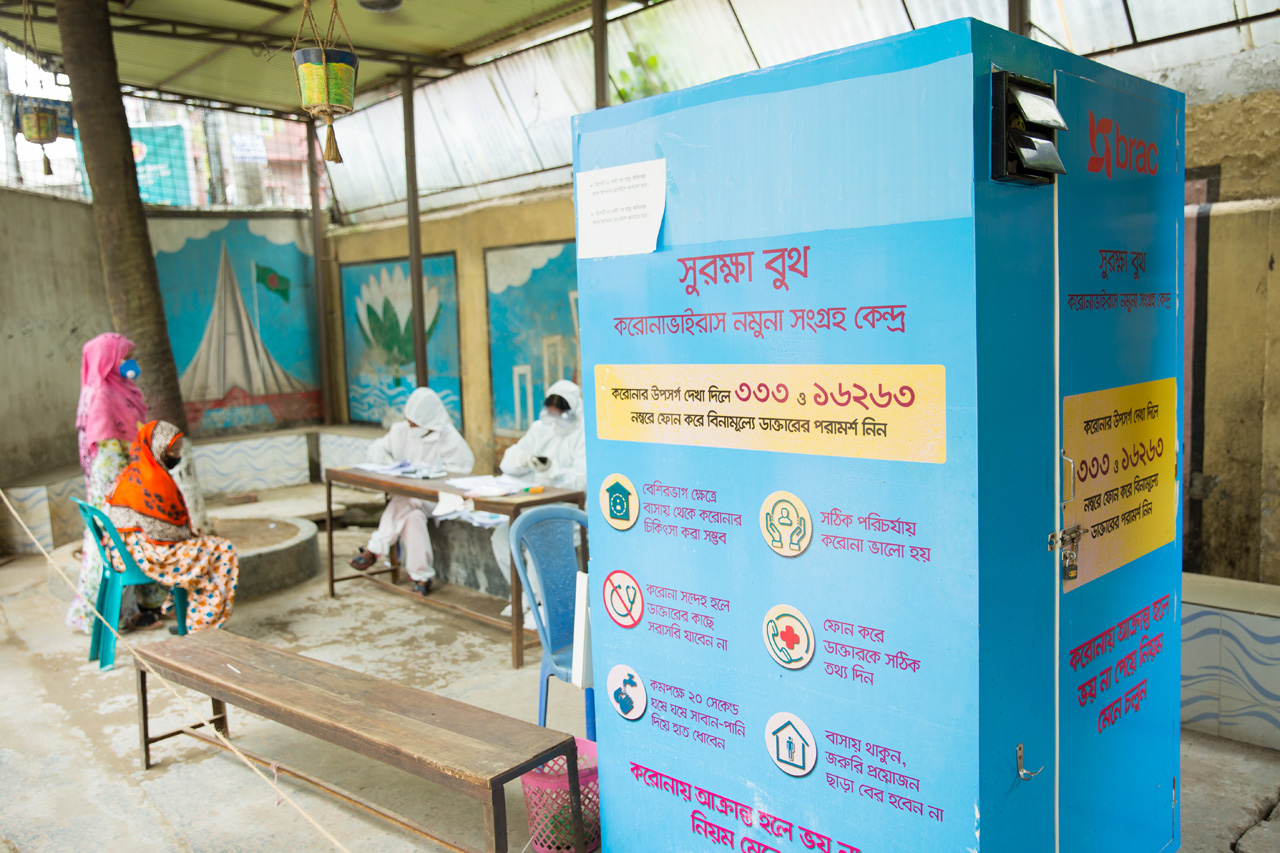
BRAC has been running 97 booths across Bangladesh for the last six months with its own funding to assist the DGHS (Directorate General of Health Services) in COVID-19 testing.
BRAC has been reaching out to donors and partners to mobilise resources. BRAC has very recently secured a donation from The Global Fund, which will enable us to keep these booths open till 31 December, 2020.
BRAC is committed to continue to support the Government and the people of Bangladesh in any national crisis. It will continue to play a key role in the pandemic response and recovery, to the best of its ability and with support from the donors and partners.
BRAC announces BDT 100 million to 50 thousand flood-hit families

BRAC will assist 50 thousand severely flood affected families with BDT 100 million (10 crore) with each family receiving BDT 2,000 as cash assistance.
The assistance will be given to families in 15 worst-flood hit upazilas in seven districts namely, Kurigram, Lalmonirhat, Gaibandha, Bogra, Serajgonj, Jamalpur and Sunamganj. The money will be sent through bKash mobile money operator.
Asif Saleh, executive director, BRAC, said, "BRAC has always stood by the people hit by natural calamities. Our staff gave relentless services in the areas hit by Aila, Mahasen, Amphan and other cyclones in the past. We are committed to stand by people seriously affected by this year's flood and give cash assistance which will help them meet their urgent necessities."
Having given a general call for assistance for the flood-hit people, the executive director further said, "We are also calling on individuals and institutions to extend their generosity towards these families in distress. BRAC has taken up an initiative to collect funds so that more families can be reached with assistance."
4.7 million people in 31 districts have been affected by flood this year with Jamalpur having most of its region inundated. So far, 41 people have died, mostly by drowning. Nearly one million households are waterlogged. Around 90 thousand people with around 76 thousand cattle are staying at emergency flood shelters.
BRAC continues its response with different initiatives since the beginning of the flood this monsoon. Early warning messages were sent through four community radio stations, social media platforms and its field staff in the remote and worst hit regions, by incorporating COVID-19 measures. Dry food and oral saline packets were distributed to the waterlogged families in Islampur and Dewanganj upazilas of Jamalpur. BRAC also installed sanitary latrines adjacent to the flood shelters at Porsha upazila in Naogaon district. Also assistance was reached to the worst suffering families in Kurigram from a fund contributed by Greta Thunberg Foundation.
Greta Thunberg to donate €100,000 prize money to flood relief efforts in India and Bangladesh
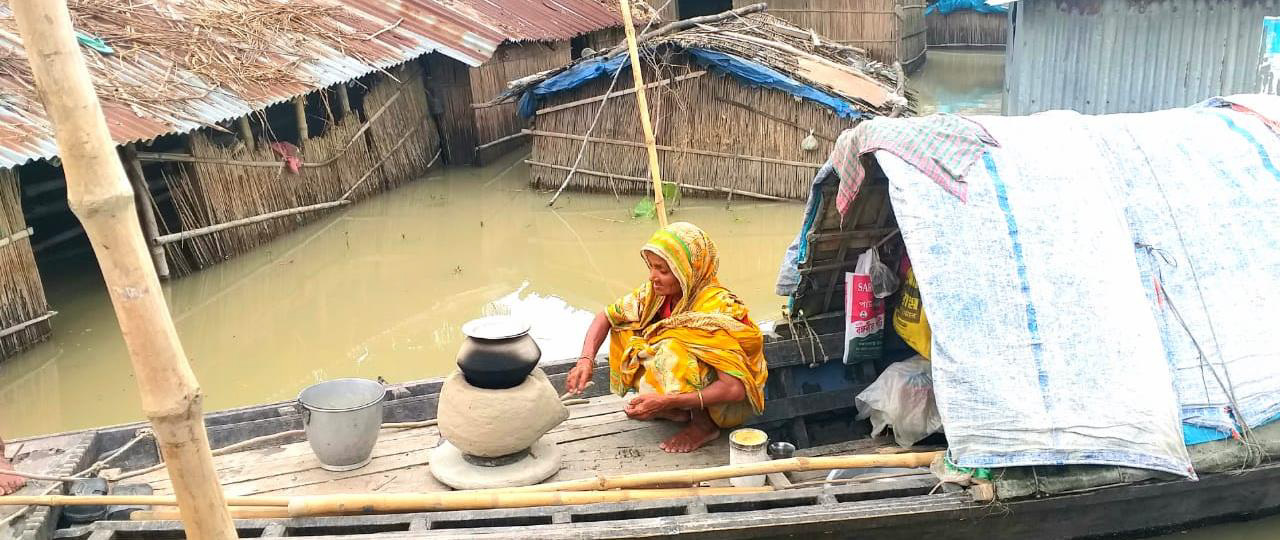
The money will go to organisations providing direct relief to people suffering from the humanitarian crisis caused by ongoing extreme monsoon flooding in both countries, currently affecting over 9.6 million people in the region.
The donation comes after Greta was awarded €1 million for winning the Gulbenkian Prize for Humanity, announced last Monday 20 July. The Greta Thunberg Foundation will donate the full sum to charitable projects combatting the climate and ecological crisis and supporting people facing its worst impacts, particularly in the Global South.
In India, more than 6.8 million people have been affected by recent severe monsoon floods. The north eastern states of Assam and Bihar are particularly badly affected, with 113 deaths recorded since this year's monsoon season began. Meanwhile, close to one third of Bangladesh is already suffering flooding, with 2.8 million people affected. Although floods occur annually in these areas, the climate crisis is increasing their frequency and intensity, with current flooding among the worst in years.
This flooding has also come during a period of overlapping crises facing communities in India and Bangladesh. In March, Cyclone Amphan destroyed crops, infrastructure and more than 260,000 homes in both countries, while a Covid-19 lockdown has contributed to over a third of Bangladesh's population dropping under the poverty line.
The donations will go to 3 NGOs in desperate need of funds for flood relief work in India and Bangladesh. BRAC, who will receive €25,000, are working on the ground in Bangladesh to provide critical relief for impacted families, including dry food, temporary shelter and health services. ActionAid India and Bangladesh, receiving €50,000, are working in both countries to provide emergency relief, as well as long term rebuilding. Goonj, receiving €25,000, are providing clothes, food, medicines, and other essential items to affected areas in India.
Greta Thunberg said:
"The climate crisis is urgent, and people, particularly in the Global South, are suffering devastating impacts already today. Millions of people in South Asia have been severely affected by recent flooding, at a time when many had already lost so much from Covid-19 and Cyclone Amphan. International media are largely ignoring this devastation, but we must do everything possible to directly support those suffering on the ground, who are in desperate need of resources. I am incredibly privileged to be in a position to be able to donate such sums of money through my foundation, and we are supporting these organisations to make sure it reaches communities affected by the flooding as soon as possible. If you are able, please consider donating to the relief effort."
Asif Saleh, Executive Director, BRAC Bangladesh, said:
"Funds are exhausted, and support is urgently needed to help those suffering on the ground. The unusually prolonged flooding, combined with the fact that many communities are still recovering from Cyclone Amphan and the country is in the grip of a global pandemic have combined in a perfect storm of factors which has seen millions of people lose homes, livelihoods and thousands of acres of croplands vital for food security. Whole families are living on the sides of roads, without drinking water, food or access to sanitation. BRAC is on the ground in all 64 districts in Bangladesh and is working closely with the government to reach the people in the most need."
Sandeep Chachra, Executive Director, ActionAid India, said:
“Monsoon flooding in the Indian states of Assam and Bihar is increasingly catastrophic, year on year. It is making living conditions for vulnerable communities in these regions ever more precarious. This year the floods are a part of a double whammy, on top of the Covid-19 pandemic and accompanying lockdown. Emergency responses need to be linked with long term development work aimed at advancing social and ecological justice, in an effort that prioritises the leadership of communities most affected. In ActionAid Association India, we seek to build resilience and reduce risk, while ensuring a community-led, long-term response, especially with female leadership."
Farah Kabir, Country Director, ActionAid Bangladesh, said:
“The unprecedented floods in 2020 have left hundreds of thousands homeless. The monsoons are not yet over and we are already facing a third wave of flooding. Climate change induced loss and damage is increasingly taking its toll, with women and children suffering the worst in terms of displacement, loss of food security, and loss of livelihood, leading to social unrest and resulting in increasing gender based violence and child marriage. Bangladesh is one of the most resilient countries in the world, and we are used to living with floods, but not with floods three or four times in less than a year. There is a limit to how much we can cope with and adapt to. These families must be compensated to rebuild their homes and restore their livelihood in a climate proof way. We demand climate justice and we need support.”
Anshu Gupta, Founder/Director, Goonj, said:
“Right now, floods in parts of India have heaped more misery onto the lives of millions of people already struggling with the impact of Covid-19. Our work focuses on bringing relief to people in the most remote and left out geographies, addressing their local issues and enhancing their dignity by motivating and empowering them to take action. In our two decades of disaster response work, we have been highlighting monsoon floods as an ignored disaster that are becoming more intense and frequent. In this difficult time we must all work closely with the communities most affected.”
BRAC addresses devastation from Cyclone Amphan amid COVID-19 in Bangladesh
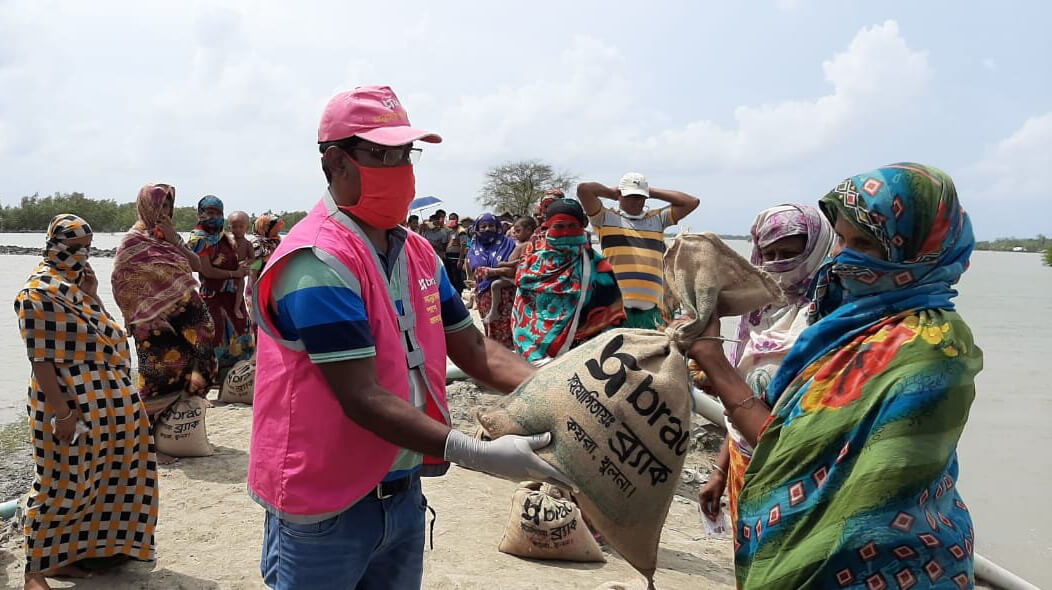
Response and recovery efforts supported by $300,000 grant from the Bill & Melinda Gates Foundation
In the aftermath of Cyclone Amphan, the super cyclonic storm that devastated coastal communities in Bangladesh in late May, BRAC has been carrying out response and recovery efforts, made more complex by the COVID-19 pandemic. With more than 200,000 homes reportedly destroyed or damaged, families sought refuge in neighboring homes and shelters, increasing the chance of contracting COVID-19 in the absence of social distancing.
BRAC has quickly started to provide multi-purpose conditional (repairing of houses and latrines, and installation of tippy taps) cash support to 4,600 cyclone-affected households to enable families to return to their own homes in 10 sub-districts in the districts of Satkhira, Khulna and Bagerhat. The cash assistance of BDT 5,000 (USD ~$60) per household is being provided by mobile money transfers in two installments. Training is also being provided to residents to install hand washing stations through demonstration efforts, maintaining social distance, so they can wash their hands safely and reduce the risk of COVID-19 spread.
Without access to clean water, it is difficult to maintain basic hygiene practices to prevent contraction of COVID-19 and diarrhoea. Awareness messages on basic hygiene practices and COVID-19 infection prevention and control are being disseminated by BRAC staff, who are trained on COVID-19 prevention practices.
BRAC’s emergency response is supported by a $300,000 grant from the Bill & Melinda Gates Foundation. The grant funded relief and recovery efforts to people suffering the impact of Amphan in Bangladesh.
BRAC’s disaster response efforts in Bangladesh have benefited from funding by the Bill & Melinda Gates Foundation several times in the last 13 years, starting with Cyclone Sidr in 2007. Most recently, the foundation provided a grant of $300,000 last year for flood relief.
“BRAC has always looked to the Bill & Melinda Gates Foundation as a key partner in our effort to provide life-saving services to the most vulnerable people, especially during humanitarian crises,” said Asif Saleh, Executive Director of BRAC. “This support was no exception. It allowed us to mobilise resources quickly, during the COVID-19 pandemic, to provide much-needed cash support to the families most affected by Cyclone Amphan so they can get back on their feet.”
95pc people suffer losses in income
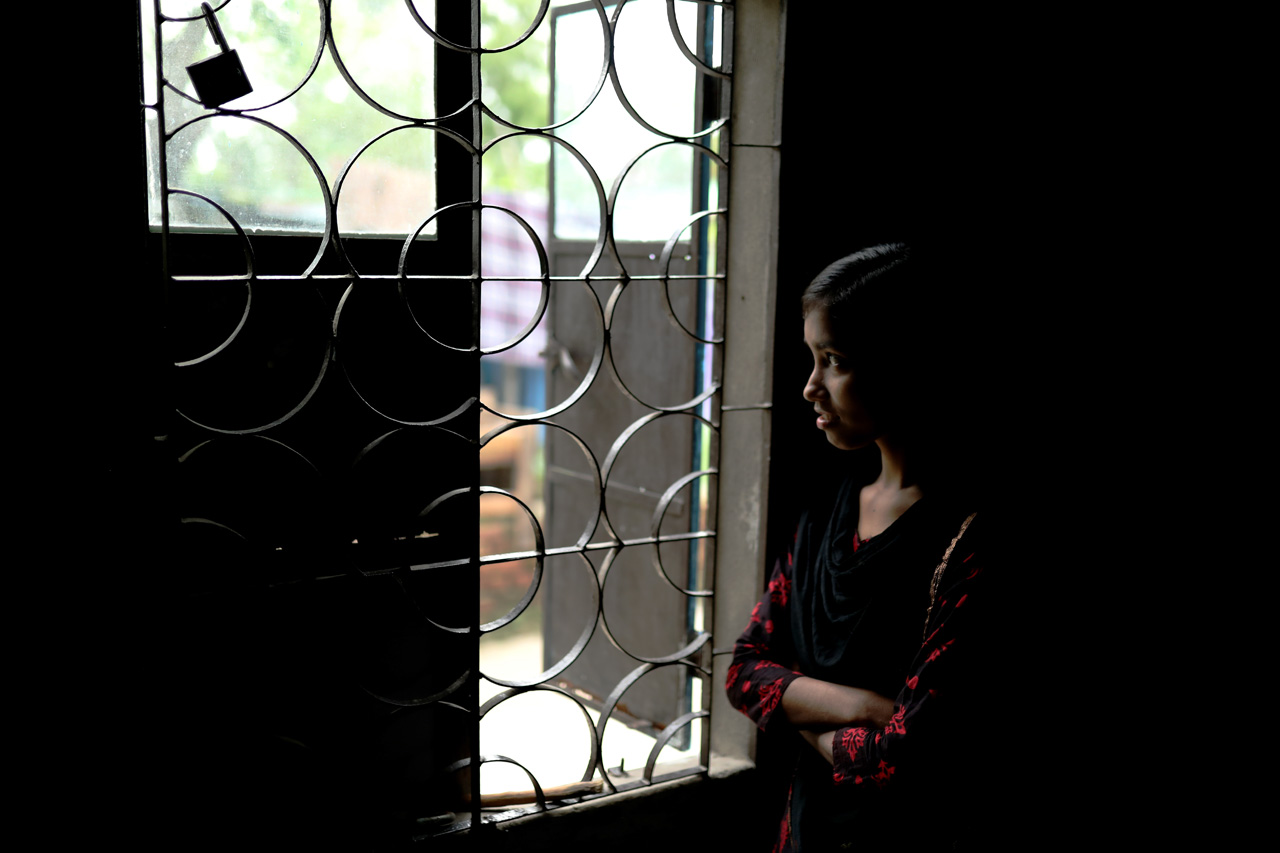
BRAC has recently conducted a survey to get an insight into the overall sense of public awareness about the COVID-19 pandemic and its economic impact in Bangladesh. A total of 2,317 respondents (68% from rural areas and 32% from urban) from different socio-economic backgrounds in 64 districts joined the survey conducted from 9 to 13 May 2020. Of them, 37.5% were men and 63.5% women. The survey analysis shows daily wage earners have slowly started to regain their livelihood. However, many of these people and their families will still need support for at least three more months to recover from the setback posed by the pandemic.
The findings of the perception survey titled ‘COVID-19 awareness and economic impact’ were revealed at a digitally organised press conference today, on Tuesday (9 June 2020). Abul Kalam Azad, Former Principal Coordinator (SDG Affairs), Prime Minister’s Office, Sudipto Mukherjee, Resident Representative of UNDP in Bangladesh, Mizanur Rahman Khan, Joint Editor, Prothom Alo, Shameran Abed, Senior Director, BRAC, and Nobonita Chowdhury, Director, BRAC, joined the event as panellists. KAM Morshed, Senior Director, BRAC, moderated the press conference.
Speaking at the briefing, former Principal Coordinator of SDG Affairs at the Prime Minister’s Office Abul Kalam Azad lauded the BRAC initiative and said all microfinance institutions (MFIs) and NGOs need to follow BRAC footsteps in returning savings to low income people.
“The government is trying to finance the labour intensive sectors so that it can help create more jobs. Skills development training for migrant workers can also help them get back their jobs in the current crisis,” said Azad.
BRAC Senior Director Shameran Abed accredited the role of MFIs in reaching cash assistance to vulnerable people and enterprises.
“Getting money to people through banks is challenging since banks lack capacity. A new mechanism is needed and the mobile banking system is already delivering. Once identified, people are getting easy access to finance through the system,” Shameran Abed said.
BRAC, with the help of donors and partners, has delivered emergency cash support to 360,000 families. Under the Microfinance programme, savings were returned to 500,000 members, to support in their economic recovery process.
Sudipto Mukherjee, Resident UNDP Representative, stressed on concerted efforts to avert the crisis posed by the pandemic.
“We cannot afford to leave anyone behind. That is more important than being concerned about duplication. Universal protection is required for a welfare state like Bangladesh,” Mukherjee said.
At the same time, the next plan of actions should focus on getting the economy back on its feet, maintaining proper health precautions.
Suggestions to tackle the crisis included strict introduction of a ‘pro-poor’ lens to review and implement the recovery and rehabilitation plans as well as the already declared stimulus packages or incentives.
Transparency was stressed for delivery mechanisms of assistance and stimulus packages for different private sectors. Authorities were urged to engage NGOs and community-based organisations to monitor the listing of beneficiaries and cash transfer through mobile banking was stressed for distribution.
Preparing a database of beneficiaries to avoid duplication and introducing a prompt complaint redressal mechanism were also recommended.
Survey Brief
The lockdown and social distancing measures announced to contain the spread of the COVID-19 pandemic forced 95% people across the country to suffer a loss in their income. Approximately 51% of the respondents said their household income was reduced to zero after the public holiday was declared in late March. Around 62% of low income wage earners lost reduced work opportunities. The pandemic left around 28% of the respondents economically inactive. Average monthly household income of the respondents was BDT 24,565 before the public holidays, but that declined to BDT 7,096 in May, registering a 76% decline in household income. Loss in income was somewhat greater in urban areas (79%) than in the rural ones (75%).
Respondents from Pirojpur (96%), Cox’s Bazar (95%), Rangamati (95%), Gaibandha (94%) and Brahmanbaria (93%) were found to have suffered greater losses in income.
In the survey, women-headed households were found to be more economically vulnerable compared to households headed by men. Average income of women-headed households declined more (80%) than men-headed households (75%). Women-headed households (57%) reportedly had their monthly income reduced to zero during the public holiday, which was 49% for households headed by men.
The loss in income inevitably impacted food security, particularly of the low income people. On an average, 16% of overall households reported that they had food only to survive for 1-3 days, while 3% of the households did not have any food during the survey time.
The survey found 11% of respondents think that there was an increase in violence against women during the holidays. Majority (58%) of them think that violence increased as poverty was intensified by the pandemic.
More than three-fourths (76%) of respondents now practice coronavirus preventive behaviours, while the remaining one-fourth practices the behaviours irregularly, which is alarming. More than three-fourth (78%) respondents feel that there is no chance or very little chance for them of getting infected with the coronavirus. Respondents from rural areas (81%) compared to urban areas (71%) express more confidence about not getting infected. Such beliefs might spread reluctance among people in maintaining the precautions against the spread of coronavirus.
About 38% of the respondents believe more coordinated efforts are needed to reach assistance to the people in need. The survey also found that the need of assistance is higher in rural areas (72%) compared to urban areas (62%).
Download: Economic Impact of COVID-19 and Way forward for Bangladesh
Download: Rapid Perception Survey on COVID-19 Awareness and Economic Impact
BDT 565bn loss in farmers' income in 45 days
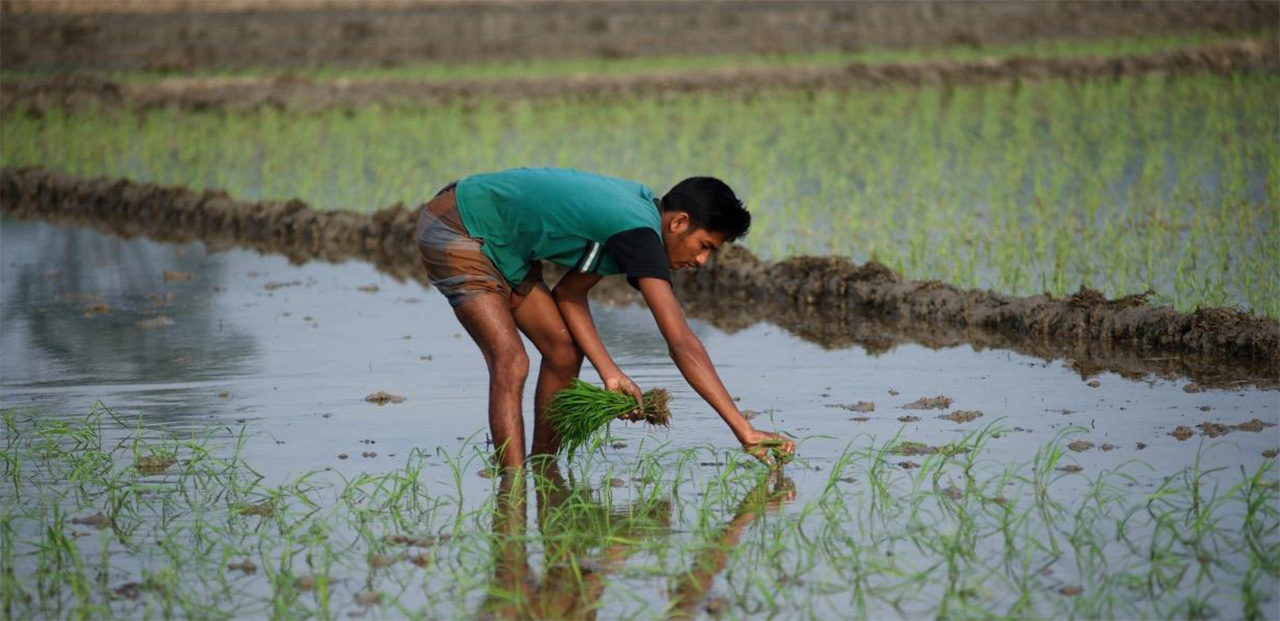
The agriculture sector took a major hit as farmers across the country suffered a steep loss worth approximately BDT 565.36 billion (56,536.68 crore) during the public holiday announced to contain COVID-19 pandemic. This loss was incurred in one and a half months between March and May.
This was revealed in a research conducted by BRAC during these 45 days. The research covered all the subsectors namely, crop and vegetables farming, poultry and livestock and fishery. Two studies were carried out as part of the research, one of which surveyed the situation of the farmers at the producers' end, while the other focused on the market situation and how its disruption impacted the farmers during this period. A representative survey was also conducted under the research interviewing 1,581 farmers across the country.
The findings along with a number of recommendations of the research titled “Impacts of COVID-19 pandemic on agriculture and implications for food security” were revealed at a digitally organised press conference today, on Thursday (4 June 2020).
Dr MA Sattar Mandal, former vice chancellor of Bangladesh Agricultural University and former member of Planning Commission, Eleash Mridha, managing director of PRAN Group, Dr FH Ansarey, managing director and CEO of ACI Agribusiness, and Mohammad Anisur Rahman, director of BRAC Dairy and Food Enterprise, joined the event as panellists. KAM Morshed, senior director, BRAC, moderated the press conference, also attended by journalists, agricultural specialists and researchers, among others. Two farmers also joined the event to share their experience.
The findings show the prices and sales of essential agricultural products, especially coarse rice and red lentils, went up during the early days of the pandemic due to panic buying of consumers and high demand of relief-providing entities. The trend resulted in the rise of rice and lentil prices by 30-32% while the traders had a 300% rise in their sales of these products. However, the surge in market demand could not benefit the farmers as they sold their stock before the pandemic began.
The producers of non-relief and perishable items also had a hard time to continue the production and sell of their products. Overall, 88% of all farmers (100% of fish farmers) reported economic losses owing to production and marketing problems.
Farmers mentioned lack of fair prices (66%), limited operation of markets (52%), higher prices of inputs (45%) and unavailability of labour (28%) as the prime causes behind their sufferings.
Due to damages to their produce and low prices, each farmer suffered a loss of an average of BDT 207,976 during the 45 days period. Based on the number of farmers in the country in each of the sub-sectors, the value of loss was estimated at BDT 565.36 billion.
Ex-member of the Planning Commission Dr MA Sattar Mandal thanked BRAC for conducting the research and said retailers, distributers, agents and middlemen should be prioritised and that their expertise should be utilised to tackle the current situation as they play important roles in the market.
PRAN Group MD Eleash Mridha said measures should be taken to facilitate farmers in those areas where the spread of coronavirus is lower.
ACI Agribusiness MD Dr FH Ansarey stressed on tech-based agricultural innovation.
“Agro processing technologies need to be given preference. The government should allocate BDT 10bn (1000 crore) for improving connectivity of farmers with the private sector, dealers and extension service,” he said.
BRAC Dairy and Food Enterprise Director Mohammad Anisur Rahman said constant decline in demand since the beginning of the coronavirus pandemic spoiled farmers’ produce at a huge margin. Dairy farmers suffered a lot as they had to dump milk, he said “If the situation lingers, the result will be ominous. If farmers change their profession, food safety of the country will be endangered,” Rahman added.
Of the farmers interviewed, 42% reported that they had no way to cope up with the crisis, while 60% of crop and vegetable farmers said they had to absorb the losses fully. Approximately 11% of all farmers and 17% of poultry farmers had to reduce their production, while another 2% stopped production. Poultry farmers encountered huge losses as prices dropped by 44% owing to the closure of all restaurants during the holiday.
As the demand of poultry products reduced, the farmers reduced their production too, which resulted in the shortage of supply and thus the prices increased. Prices rose by 26% for farm chicken and 8% for eggs during second week of May.
As the demand declined by almost 33-60% with the prices going down by 12.5% at the retail level and 22% at the farmers’ end, livestock farmers had to reduce their production.
Of the interviewees, 41% respondents (69% of fish farmers) are planning to depend on credit to survive, 14% will have to depend on their alternative income sources, 18% will either draw money from savings or sell their assets. Another 18% of the respondents still have no plans and 5% are planning to change their profession if they have to discontinue their production.
Of the respondents, 66% want to get loans from the government on easy terms. As many as 56% farmers want fair prices for their produce, while 48% want necessary inputs at affordable prices.
Of the farmers interviewed, 64% are aware of incentives the government announced for them, but 79% of them had no idea or had a misconception about how to avail the facility. Most significantly, only 20% of the respondents reported to having prior experience of taking formal loans from banks.
The studies also gave a number of recommendations based on their findings, which include developing a farmer-friendly credit disbursement system, introducing innovative disbursement mechanisms through mobile financial services and NGOs, and reducing red-tape barriers.
Ensuring wide-scale injection of cash to boost people’s purchasing power, Ensure the government’s intervention in procurement and supply chain systems to rectify price falls such as establishment of collection centres for agro-produces closer to smallholder producers, and facilitating and providing incentives so the backward and forward linkages to adequately improve the support system to the industry were also recommended in the research.
Developing sub-sector-specific short, medium and long-term plans, focusing on innovative tech-based agribusiness models and making quality seeds and other inputs available to farmers were also stressed.
Special schemes recommended for poor in 2020-21 budget
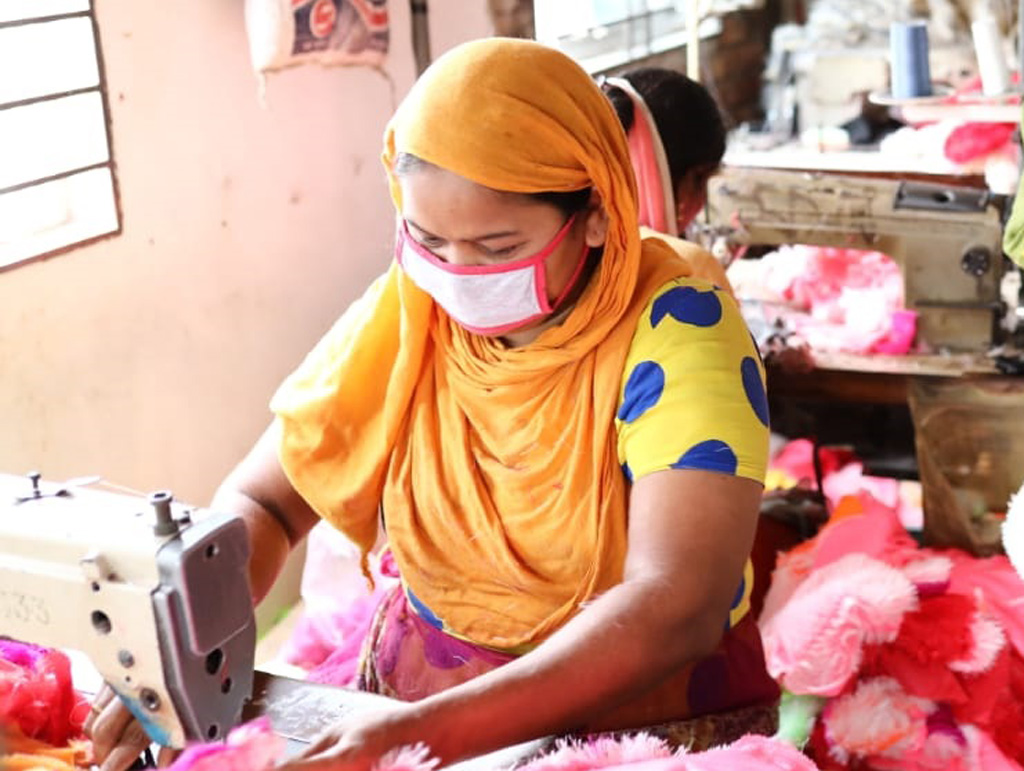
Bangladesh’s economy and development are at a critical juncture in the wake of COVID-19. Financially poorest people are most affected in terms of both economy and health. At present 100.22 million people face high risk of economic and health vulnerabilities. The average family income loss between March and May hovers at around 74 per cent. Over 1.4 million migrant workers have returned or are on their way back home due to job loss.
The above scenario is brought upon by a joint exercise of BRAC, DataSense and Unnayan Shamannay, attempting to develop a vulnerability index. The findings and recommendations of the study titled "COVID-19 and national budget 2020-2021: Rethinking strategy for bottom of the pyramid" were revealed at a digitally organised press conference today on Monday (1 June 2020).
Dr Hossain Zillur Rahman, noted economist, chairman of Power and Participation Research Centre (PPRC) and chairperson of BRAC, presided over the event with Dr Atiur Rahman, former governor of Bangladesh Bank, present as the chief guest. KAM Morshed, senior director, BRAC, moderated the press conference. Dr Ananya Raihan, chief executive officer, iSocial, presented the survey report. Dr Nazneen Ahmed, senior research fellow, Bangladesh Institute of Development Studies (BIDS), and Dr Imran Matin, executive director, BRAC Institute of Governance and Development (BIGD), were present as panel speakers.
The findings and recommendations of the study are drawn from holistic reviews of a number of studies recently conducted by BRAC, BIGD, PPRC, International Monetary Fund and other national and international bodies, along with the data obtained from a primary survey, which was conducted on 962 respondents randomly selected from 25 districts of the country, during the period of May 15-18, 2020.
The study findings show that among the people at high risk of economic and health vulnerabilities, 53.64 million are extreme poor, including those pushed down to extreme poverty by the pandemic. (By definition of extreme poor: $1.9 PPP income per day. While 47.33 million extreme poor face high economic risk, 36.33 million are at high health risk.
The primary survey reveals that the pandemic has variously affected the low-income people. It shows that 34.8% of households interviewed have at least one member who lost their job. The average family income loss between March and May hovers at around 74%. People in the informal sector, including day-labourers, have suffered most. The manufacturing sector also experienced a major blow. For example, the readymade garment sector experienced 84% reduction in exports in April 2020 compared with April 2019. Between mid-March and April 7, 2020, 1,116 factories have been reported closed and 2.19 million workers lost their job.
The study further reveals that -
Bottom of the pyramid population is at higher risk of contracting the disease. In case of death of the earning member of the family, there is a high chance of starvation and malnutrition, especially among women and children.
Earlier studies and reports suggest that due to lack of country-wide coordination and collaboration, food and cash support from the government could not be adequately reached to the poor and extreme poor.
The COVID-19 is causing new kinds of economic, social and digital divides. As only 34% of households have access to smartphones and 54% have access to TV, children of the lowest economic rung mostly remain excluded from any form of education provided through digital channels.
More than one million migrants have returned or are returning home due to job loss. The migrants staying in the destination countries have become subject to a debt trap, social stigma and an uncertain future.
The COVID-19 has imposed further difficulties on the lives of people with special needs and their families.
Dr Atiur Rahman said, "Medium, small and micro enterprises need help as 60% of them will be out of business. We can allocate BDT 20 thousand crore for this sector. The entire BDT 20 thousand crore needs to be refinanced by the Bangladesh Bank. Banks are not interested to give loans to MSMEs which they don’t know. Refinance line has to be increased so that risk sharing by bank is promoted."
"There is no risk of inflation yet. Economy is not that vibrant. Fuel prices are low because world market prices are low," he observed.
"Microfinance institutions can be given more refinancing facilities. Also banks should be given credit guarantee schemes so that they are encouraged to provide credit to MSMEs for which budget allocation is required," he further said.
Dr Nazneen Ahmed said, "Fuel subsidy to transport operators can be provided so they will not require to increase fares."
Dr Hossain Zillur Rahman in his chair's speech said, "Instead of making new lists it is best if existing lists can be used. Instead of BDT 100, BDT 500 per head may be allocated as stipend for 7.8 million primary students. That way we can ensure support reaches to the right people."
"The budget needs to be reflective, open to criticism, skilful in strategy," he stressed.
Based on the study findings, a number of recommendations were made to include in the national budget of fy2020-21 that include the following.
Introduce cash transfers for COVID-19 positive patients for income losses and 3-year cash support if any income earner of the extreme poor and poor households dies due to COVID-19.
Introduce universal unemployment benefit scheme, starting with extreme poor and poor by FY 2020-2021 and for other unemployed groups from FY 2021-2022.
Introduce a universal identification system of citizens (irrespective of age) for enabling citizens to access services and receive benefits within FY 2020-2021.
Include all citizens into universal digital services for getting benefits of social protection schemes, credit, savings and insurance services through public-private partnership.
Launch a special programme for returnee migrants at home and migrant workers in destination countries as well to compensate income loss, create jobs and help them get out of debt trap and social stigma.
Introduce access to individual digital devices and internet connectivity to all Bangladeshi citizens above 16 years old to ensure access to livelihood, education, health and safety.
Allocate maximum resources for fighting COVID-19 and enforce public-private-NGO collaboration and coordination.
Also to minimise health risks, a mix of work-from-home and work-from-office has been proposed. Besides, six-hourly workdays with up to three shifts for offices and factories have been recommended to reduce traffic on the road, maintain social distancing at the workplace and public transport.
BRAC floats BDT 3 crore for 6,000 Amphan affected households

BRAC has allocated a budget of BDT 30 million (3 crore) for low-income families in 10 upazilas of three coastal districts to help repair of households and water sanitation and hygine (WASH) facilities damaged by Cyclone Amphan.
Amphan killed at least 22 people as it thumped the country’s coast on Wednesday with gusting winds and heavy rainfall.
Under the initiative, approximately 6,000 households at Shyamnagar, Asashuni, Kaliganj, and Kalaroa upazilas in Satkhira; Koira, Paikgachha, Dacope, Botiaghata and Dumuria upazilas under Khulna and Sarankhola upazila under Bagerhat will receive BDT 5,000 each. A team from BRAC Humanitarian Programme will select the households and start distributing the money within one to two days after the upcoming Eid-ul-Fitr so that affected people can start repairing their houses and WASH facilities.
Sajedul Hasan, Director of Humanitarian Programme, BRAC and BRAC International said,
“More than 20 districts were affected after cyclone Amphan hit Bangladesh. People lost their home, and sanitization. Now they are living with their relatives, some of them sharing bed with their neighbor. Don’t forget that we are also facing pandemic situation. Social distancing is much needed at this stage. So BRAC has taken the initiative to rebuild houses, toilets for the people who are affected as early as possible. We are also arranging safe drinking water for people who are affected.’’
BRAC sent 12,000 masks, 12,000 gloves and 240 sanitisers to Khulna, Bagerhat and Satkhira districts three days before Amphan hit the coastline so that people living in these areas could ensure hygiene practice during the ongoing coronavirus outbreak.
BRAC has also launched a fundraising appeal to scale up the effort and increase the coverage. Individuals and any organisation can donate. Details are available on BRAC website: https://www.brac.net/covid19/donate/. Anyone can donate to the fund through bKash app.
Donations can also be sent to:
Account name: BRAC
Account number: 150120-2316474001
Bank name: BRAC BANK
Bank branch: Gulshan 1, Gulshan Avenue, Dhaka.
Join the world’s biggest family

